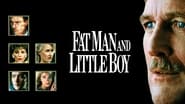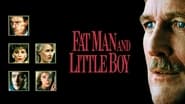LeonLouisRicci
Director Roland Joffe, who never came close to His acclaimed early achievements (The Killing Fields (1984) and The Mission (1986), delivers a much Maligned Interpretation of 'The Manhattan Project". The well known Collaboration of Scientists Sequestered to develop the Atomic Bomb.The Film is Basically the Conflict/Cooperation of General Groves and Robert Oppenheimer, Their Philosophies and Determination to achieve a "Wonder Weapon" to End the Second World War. It's a Wonder that it Succeeded given the Enormity of it all and Conflicts by Everyone Involved.Entering into an Unknown Territory of Unintended Consequences and Intended Destruction combined with Unspeakable Immediate and Long Term Decay of People and the Planet. This was a Difficult Film to Pull Off as Mainstream Entertainment and Intellectualizing. The Effort was not Greeted Kindly by Audiences and Critics.But it is Better than its Reputation and is Thought Provoking, if not a Grand Piece of Cinema. Paul Newman as Groves and Dwight Schultz as Oppenheimer are equally Successful as Convincing Combatants. John Cusack's Everyman, who Suffers First and Foremost, is Symbolic of the Power of Plutonium and Uranium.Man Tinkering with the Stuff of the "Gods" is an Historical Contemplation since Thinking became a Thing and will Likely be Food for Thought for Ever. The Movie uses Real Life, circa WWII, as a Vehicle to Vent that Concern and is Worth a Watch for it is a Subject that is Timeless in Regards to Our Place in the Universe.
ReelCheese
It was a fascinating story waiting to be told. FAT MAN AND LITTLE BOY takes us inside the trials and tribulations of a group of top American scientists handed a lofty task during the Second World War: beat everyone else to the atomic bomb. Sequestered in a heavily-guarded New Mexico compound, the brainiacs slowly turn the idea from ambitious concept into immense reality.FAT MAN AND LITTLE BOY is one of those films that requires your close attention. It's a real thinking person's movie, not only from the scientific aspect of developing a seemingly impossible weapon, but also the moral implications of contributing to killing on a massive scale. Characters are constantly torn between that reality and their wartime duty as Americans. The film is never preachy about, however, leaving us free to marvel at the enormity of the inner turmoil these men face. The performances deserve special mention as well. Paul Newman delivers one of his great, understated performances as the Pattonesque general in charge of delivering the ultimate big stick for the Allied Forces.Where FAT MAN AND LITTLE BOY loses much of its traction is in the unnecessary romantic component. Dwight Schultz as the leader of the scientific team struggles with his affections for his family and his relentless obsession with his big project. Director Roland Joffe apparently felt the need to explore the more human angles of this story, but the romantic overtones serve primarily as a distraction. Besides, it's the interaction among the scientists and their military hierarchy that give us the greatest insight into the thoughts and feelings of these brilliant men.Still, it's difficult not to recommend FAT MAN AND LITTLE BOY. It's a largely forgotten gem that puts a human face put on one of the most intriguing stories in human history.
Matt
rather, a badly savaged original screenplay. i've just been reading the chapter on this film and its inception in Alistair Owen's brilliant book of interviews with Bruce Robinson ('Smoking in Bed'). the point made here is that the then wonder-boy Roland joffé royally bum raped the screenplay through his own ego. Bruce Robinson defends his case well in the book and the documentary evidence which he accumulated during his research sounds pretty incontrovertible. (i can't help feeling in this respect that lot 49's comments are made from the position of ignorance he's so very keen to vilify.) it's just one of the ongoing catalogue of misfortunes for Bruce Robinson and the viewing public that he didn't get to make this particular film and we'll never get to see it. file alongside his film on jack the ripper being passed over - a proper film as opposed to the glossy, banal travesty that was...i can't even remember what the feck it was called. i just remember it being utter shite.
Harried Howie
Six stars for Paul Newman's portrayal of General Groves, negative four for the inclusion of a highly fictionalized event where the truth is well documented. Michael Merriman did not really exist. His character--or at least his fate--is based loosely on that of Louis Slotin, a Canadian physicist who did not come to Los Alamos until after the war. He conducted his lethal "tail of the dragon" experiment in May 1946. This is a critical point. The effects of hard radiation on the human body were not known until they were observed in the victims of the Hiroshima and Nagasaki blasts. Had anyone died of radiation poisoning at Los Alamos before the Trinity test, it's very possible that the scientists would have abruptly stopped their work, and history would have been changed. Whether for the better or the worse we can only speculate. Someone should ask the producers and the director whether they added Merriman's character for dramatic effect or to deliver an anti-nuclear message. For a more even-handed and accurate treatment of events at Los Alamos during the Manhattan Project, see the TV movie, "Day One," or better yet, read the Peter Wyden book on which it is based.




